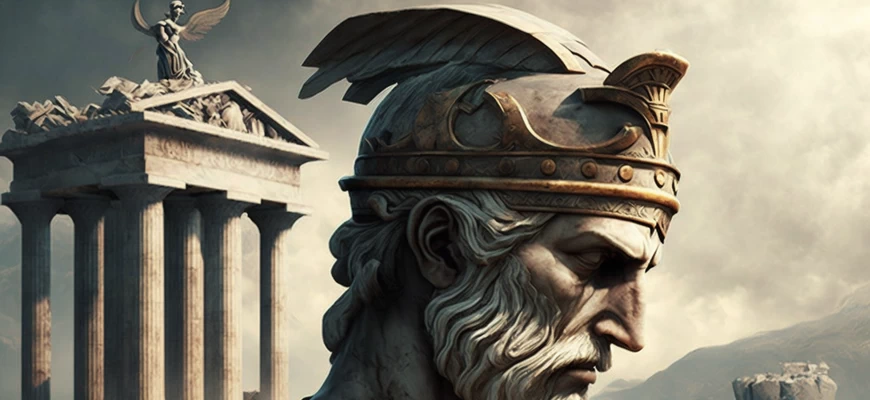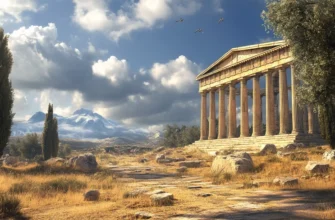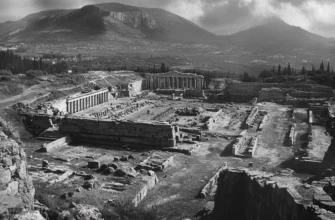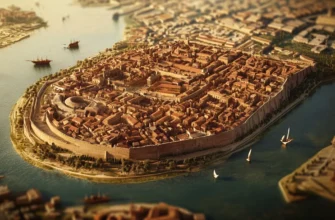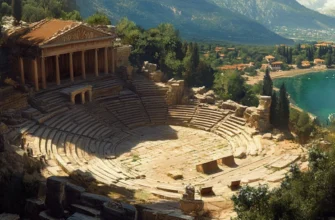Ancient Greece was a famous civilization that existed in the territory of modern Greece and part of the Mediterranean from the 8th century BC until the end of the ancient era. The Greeks were known for their advanced art, literature, philosophy, and science. They were also pioneers in democratic government, military tactics, and architecture. The ancient Greek world had a significant influence on modern Western civilization, and its cultural achievements remain relevant to this day.
Periods of ancient Greek history
Ancient Greek history is divided into several periods:
The Bronze Age (2600-1100 BC) – the period of the formation of Greek tribes and cultural centers, the development of trade and crafts.
The Archaic period (800-480 BC) was a period when Greek city-states became the main form of political organization and democracy, art, literature, and philosophy developed.
The Classical period (480-323 BC) was a period of prosperity in ancient Greece, victory over the Persian invasions, the creation of Athenian democracy, and the development of philosophy, literature, and art.
Hellenistic period (323-31 BC) – the period after the death of Alexander the Great, when Greece was divided between his descendants and other states, and culture and science flourished.
The Roman period (31 BC – 395 AD) was a period of Roman rule over Greece, the development of architecture, literature, and philosophy, and the Christian influence on Greek culture.
Myths and legends
Myths and legends are an important part of Ancient Greek culture. Some of the most famous myths are
The myth of Zeus and his son Athena – this myth tells how Zeus won the struggle for power on Mount Olympus with his father Cronus and later gave birth to the goddess of wisdom, Athena, from his head.
The myth of Persephone and Hades – this myth tells how the goddess Persephone was kidnapped to the underworld by Hades and forced to become his wife, which explains the change of seasons.
The myth of Heracles – this myth tells of the exploits of Heracles, who had to perform 12 superhuman tasks to be forgiven for killing his children.
These myths and many other legends had a great influence on the culture and art of Ancient Greece, as well as on Western culture in general. They remain an important source for studying Greek mythology and history.
Culture
The culture of Ancient Greece was highly developed and influential throughout the world. It included literature, philosophy, art, architecture, theater, sports, and much more. The most famous Greek philosophers—Socrates, Plato, and Aristotle—developed important ideas about ethics, politics, and other aspects of life that still influence world culture today. Greek mythology and literature, including the epics The Iliad and The Odyssey, are also important cultural achievements of Ancient Greece. Greek art, including sculpture and painting, was renowned for its beauty and realism. The culture of Ancient Greece left a profound mark on world history and continues to inspire people around the world today.
Art
The art of Ancient Greece plays an important role in world culture. Greek art was diverse and included sculpture, painting, architecture, and music. Greek sculptures, in particular, are renowned for their beauty and realism, as well as their reflection of the cultural and social ideals of the Greeks. The architecture of Ancient Greece was also very influential, with such notable structures as the Acropolis in Athens and the Parthenon. Greek painting was mostly represented on vases and frescoes, and Greek music played an important role in religious and cultural events. The art of Ancient Greece is considered one of the great achievements of human civilization and continues to influence contemporary art.
The literature of Ancient Greece is of great importance in world culture. It includes such famous works as Homer’s epics “The Iliad” and “The Odyssey,” the dramas of Sophocles, Aeschylus, Euripides, and Aristophanes, the philosophical treatises of Plato and Aristotle, the poetry of Sappho and Pindar, and many others. Ancient Greek literature reflected the life, ideals, and beliefs of the Greeks, their myths and legends, and remains a source of inspiration for many writers and poets to this day.
Philosophy
Ancient Greek philosophy played an important role in shaping world culture and science. It includes such famous philosophers as Plato, Aristotle, Socrates, Epicurus, Zeno, and others. Ancient Greek philosophers put forward ideas about the nature of the world, the essence of man and his relationship with other people, society, and nature. They were pioneers in philosophical thinking and developed fields such as ethics, ontology, logic, and metaphysics. Ancient Greek philosophy has had a major influence on modern philosophy and science and remains a source of inspiration for scholars and philosophers around the world.
Politics and law
Ancient Greece was known for its early democracy and developed system of justice. Each city-state (polis) had its own form of government, but most of them were democratic. Greek democracy involved citizens voting on matters important to the city, such as military affairs, legislation, and finances. Law in Ancient Greece was based on codes of laws, such as the Athenian legal code of Draco and the Laws of Solon. Greek culture gave rise to the concepts of the right to justice, equality before the law, and the recognition of individual freedom. The politics and law of Ancient Greece played an important role in shaping modern political and legal systems.
Science and technology
Ancient Greece was known for its achievements in science and technology. The Greeks were the first to use a system of mathematical proof in geometry, which was taught by Euclid. Archimedes made significant contributions to physics and mathematics, discovering Archimedes’ principle and studying the lever system. Hippocrates was the founder of modern medicine, and his hypotheses about the nature of disease and treatment are still used today. Greek engineers developed many new technologies, including the crane, the bucket, the steamboat, and the water clock. They also used complex city defense systems and invented new methods of construction. The achievements of Ancient Greece in science and technology remain a source of inspiration and study for scientists of other eras.
Society and daily life
Ancient Greece was a fairly developed society with a significant cultural and philosophical heritage. The daily life of ancient Greek society was mainly focused on agriculture, as well as the development of crafts and trade. The ancient Greeks were also known for their democracy, where political decisions were made with the participation of all citizens.
In everyday life, the Greeks paid great attention to sports and physical training. Sports competitions, such as the Olympic Games, were very popular and famous throughout the world. Science also developed in Greece, especially mathematics and philosophy, and a significant number of outstanding scientists and philosophers emerged, such as Plato, Aristotle, and Socrates.
Ancient Greek society also had its own peculiarities in relations between men and women. Although women had limited rights, they had the opportunity to receive an education and perform certain crafts.
In general, ancient Greece was a highly developed and interesting society that left a significant mark on human history.
Religion and rituals
Ancient Greece had a fairly diverse religious system with many gods and goddesses who had a huge influence on the lives of the Greeks. The main gods were Zeus, Poseidon, Apollo, Artemis, Aphrodite, and others. Each god had their own characteristics and was responsible for certain aspects of life, such as war, art, fertility, wisdom, and others.
Ancient Greek religion had many different rituals and ceremonies associated with the gods and goddesses. For example, cities had temples where sacrifices and other religious ceremonies were performed. There were also festivals, such as the Olympic Games, which took place every four years and were dedicated to Zeus.
One important aspect of ancient Greek religion was prophecy, where prophets or priests made predictions and foretold the will of the gods. There were also sacred places, such as Mount Olympus, Delphi, and others, where people gathered to ask the gods for help or advice.
An important aspect of ancient Greek religion was myths, which described the lives of gods and heroes. These myths were very important to the Greeks and reflected their values, traditions, and worldview.
In general, ancient Greek religion and rituals were very important aspects of Greek life and had a significant influence on their culture and art.
Clothing and fashion
In ancient Greece, clothing was an important element of culture and social status. Clothing consisted of simple pieces, but often had decorative embellishments.
The most common garment in ancient Greece was the chiton, a thin woolen or linen dress worn by both men and women. Women wore long chitons that were tied under the breasts and fell to the feet. Men wore shorter chitons that ended above the knees.
Another popular type of clothing was the toga, a large cloak worn only by men. The toga was intended for more special occasions, such as meetings with government officials and ceremonies.
In addition to chitons and togas, women had a variety of jewelry, such as bracelets, necklaces, and earrings, which served not only a decorative but also a religious purpose. Men also had jewelry, but not as much.
In ancient Greece, fashion was quite simple and conservative. Clothing was designed to be comfortable and functional. Most fashion trends were based on religious and cultural influences, such as myths and legends.
In general, clothing and fashion in ancient Greece reflected social status and reflected the cultural and religious traditions of the time.
Food and drink
Food and drink in ancient Greece were important elements of culture and social life. Greek cuisine reflected the diversity of the regions and used ingredients that were available in specific areas.
One of the most important elements of Greek cuisine was bread, which was made from wheat and barley. Bread was eaten at almost every meal. Other important foods were honey, olives, nuts, and cheese.
Various meat dishes, especially lamb and pork, were very popular in Greek cuisine. In addition, fish and seafood dishes such as squid and mussels were popular.
One of the most famous Greek drinks is wine. Wine was considered a symbol of the gods and was present at every important event. Other popular drinks were olive oil and mead, which was made from honey and water.
In Greek culture, it was customary to sit at the table and enjoy food and conversation. Food was served on separate plates and bowls, and all guests ate from a common bowl with spoons. It was customary to eat with your fingers rather than using cutlery, which became widespread later.
In general, Greek cuisine and beverages reflected the social, cultural, and geographical traditions of the time and were an important element of Greek culture.
A modern view of the ancient Greek world
The modern view of the ancient Greek world is quite complex and diverse. On the one hand, ancient Greek culture is considered one of the most significant in world history, and its contribution to the development of philosophy, science, art, and politics is still highly valued.
On the other hand, some aspects of ancient Greek culture, such as social hierarchy and inequality, attitudes towards women and other minority social groups, may be perceived by modern people as unacceptable and outdated.
Also, the ancient Greek world is sometimes viewed from the perspective of modern geopolitical realities and social problems. For example, researchers may use ancient Greece as a comparative material for analyzing the modern world and its problems.
Overall, the ancient Greek world remains an important element of the world’s cultural heritage and is of interest and study to both scholars and ordinary people.
Conclusions
Ancient Greece was one of the most significant civilizations in world history, leaving its mark on many areas of life, such as philosophy, science, art, and politics. Awareness of ancient Greek values and ideas still influences modern culture and worldview.
One of the key aspects of ancient Greek civilization was its developed form of democracy, which became the prototype for modern democratic systems. Ancient Greek philosophy also played an important role in the development of Western thought and made a significant contribution to the development of scientific research and practical thinking.
In terms of culture and art, ancient Greek literature, drama, music, and sculpture were highly valued for their aesthetic value and depth of content. Many of the works of ancient Greek artists and philosophers have survived to this day and inspire new creations.
Overall, ancient Greek civilization was diverse and varied, with many achievements and inventions that gave impetus to the development of the world as a whole. Its influence on culture and history remains significant, and we can gain new knowledge and inspiration by studying the ancient Greek heritage.
